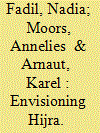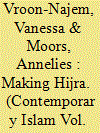|
|
|
Sort Order |
|
|
|
Items / Page
|
|
|
|
|
|
|
| Srl | Item |
| 1 |
ID:
178038


|
|
|
|
|
| Summary/Abstract |
Within the current Western European context, where the presence of Islam in the public sphere has become an object of continuous polemics and debates, emigrating or ‘leaving Europe’ has emerged as a conceivable option among a wide range of people who identify as Muslim. Both within and beyond specific pious circles such migratory moves have sometimes been framed as hijra. This special issue enquires into the way hijra is imagined and experienced, but also how the issue of hijra is debated and acted upon among European Muslims who are contemplating the possibility of leaving Europe, or who have already left the continent. In order to cover both the specific and the more general dynamics surrounding hijra, this thematic issue is motivated by one, albeit multi-layered hermeneutical objective. In general terms, we aim to understand the complex and multiple significations operating around the notion of hijra among European Muslims of various backgrounds and convictions. In so doing we seek to contribute to the mounting anthropology of Islam in Europe by examining articulations of mobility and migration through religious imaginaries and repertoires. This implies ethnographically accounting both for the perspectives and assessments of those who are situated and located in Europe and desire to leave the continent in order to perform the hijra, as well as for the ways in which hijra is lived and practiced by those who have left Europe and moved to a Muslim-majority context. In order to buttress further the emerging anthropological field at the nexus of religion and mobility/migration, this introduction cautiously maps out a number of analytical concepts which we think could strengthen the multifaceted ethnographic ventures of the contributions comprising this thematic issue: the ‘ethics of dwelling’, ‘regimes of mobility/diversity’ and religious imaginaries and repertoires, being the most prominent.
|
|
|
|
|
|
|
|
|
|
|
|
|
|
|
|
| 2 |
ID:
178040


|
|
|
|
|
| Summary/Abstract |
Drawing on long term research – including topical life stories, interviews and participant observation – we analyze how women converts to Islam in the Netherlands signify and experience making hijra. Our interlocutors, all observant Muslims, had left the Netherlands between the late 1990s and the mid 2010s. In the course of the last 5 years many have again returned to the Netherlands. Their life courses indicate that physical and existential mobility are interconnected in their everyday lives as well as in their migration trajectories. Whereas they considered conversion to Islam as moving forward, the majority society did not share this perspective. They were sharply aware of how they were no longer seen as self-evidently part of the Dutch nation. This produced feelings of stuckedness - in an existential and a material sense - for themselves and their children, and hence a desire to move to a Muslim majority country. They differed amongst themselves as to whether and how they signified leaving Europe as making hijra in an Islamic sense. To some, making hijra was a highly desirable religious act. Others did not foreground such religious signification, but nonetheless expected positive effects of living in an environment where Islam would be an integral part of daily life. Their attempts to settle in various Muslim majority countries were, however, often not successful. Material conditions made it difficult to enact their ethical aspirations, that included the moral and material wellbeing of others, especially their children. Moreover, their appreciation of the self-evident presence of Islam in the countries of settlement was tempered, first, by the tension between their quest for a reflexive, deculturalized Islam and the culturalized practices they encountered in their new environment, and second, by their growing awareness of how their sense of self was much more shaped by habitual ‘Dutch’ conventions than most of them had envisioned beforehand. As a result they were often unable to develop meaningful social relationships in their new environment. Eventually, almost all of them returned to the Netherlands.
|
|
|
|
|
|
|
|
|
|
|
|
|
|
|
|
|
|
|
|
|